Summon the soul of a cup of espresso and drink it through!
About espresso, we have talked a lot: "its basic composition and classification, what is good espresso, starting from espresso, we also evaluated the chain cafe around you" 5 'big-name' coffee, 6 cups of high-praise lattes "; drink for you the convenience store coffee" originally it tastes much better than I thought ")
I have said so much, but I have not focused my firepower on the soul of espresso.
Yes, I'm talking about Espresso.
I know you have a lot of questions. Espresso is so bitter. Why do people like it? Is it to save trouble? What on earth is the above layer of "honey oil foam Crema"?

The usual American style, latte, Cabo, Frappy Flat White. Can not do without espresso (espresso), they are on the basis of espresso, with different proportions of milk or water to form ~
Therefore, a good cup of espresso is the beginning of everything and the soul of a cup of espresso.
How is espresso made?
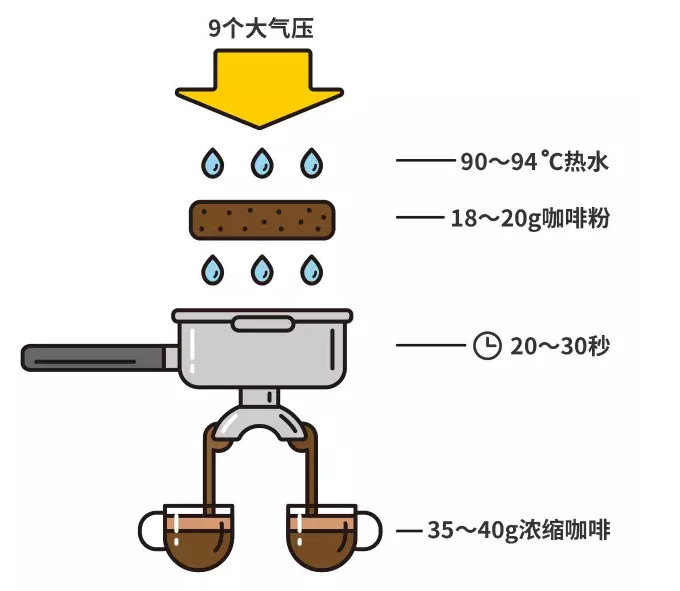
▲ takes professional espresso machine as an example
Use 18g and 20g coffee powder
About 25 seconds.
At 9 atmospheric pressure
Extract 35 to 40 grams of espresso
In a broad sense, as long as high temperature, pressure, made in a specific time of coffee, can be called espresso (Espresso).
It is worth noting that espresso, coffee powder and espresso have a very high weight ratio, usually at 1:2 (18 grams of coffee powder extract about 36 grams of coffee liquid). The weight ratio of hand-brewed coffee, powder and water is about 1:15.
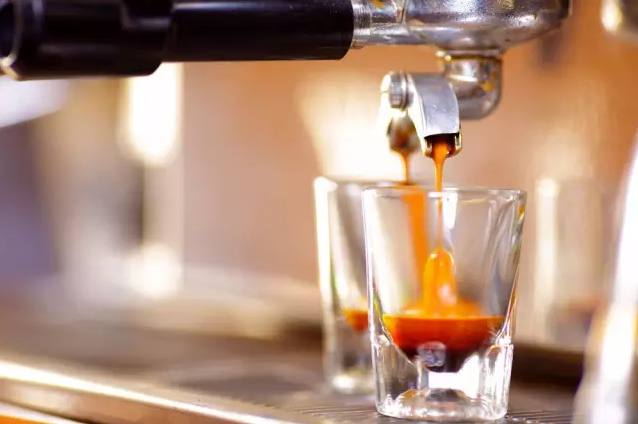
Three elements: high pressure | High temperature | Coffee powder
1 | High voltage
High pressure is the most obvious difference between espresso and other coffee extraction methods (hand flushing, pressure, etc.).
The production time of concentration is very short (only about 20 to 30 seconds), and there must be a lot of pressure to force hot water to quickly pass through the coffee powder to complete the extraction.
Commercial coffee machines can generally reach 9 atmospheres, while household coffee makers can reach 15 atmospheres. What is the concept of nine atmospheres? The pressure of the water pipe at home is about 1.5 atmospheric pressure, and the atmospheric pressure in the steel gas tank is 6. It is said that the atmospheric pressure produced at the moment of the gas explosion is also about 9.
Don't worry, the coffee machine is not that easy to explode.
2 | High temperature
Since it is coffee, there is no lack of hot water. Hot milk is used for espresso.
Hot water and milk are heated by the boiler in the coffee machine. Interestingly, the perfect temperature for hot water and milk here is actually different: the perfect water temperature for espresso is about 90 to 94 degrees, while milk with milk foam needs more than 100 degrees.
A better coffee opportunity will separate the two functional coffee boilers. This is how single boilers and multiple boilers are separated! So, reliable baristas (such as me) usually recognize multiple boilers.
3 | Coffee powder
With high pressure, with hot water, you still need coffee powder!
As mentioned above, the production time of concentration is very short, in order to extract the aroma and flavor of coffee in just 30 seconds, in addition to high pressure, coffee powder must be ground very fine. So, you need a bean grinder that can grind very fine and uniform powder.
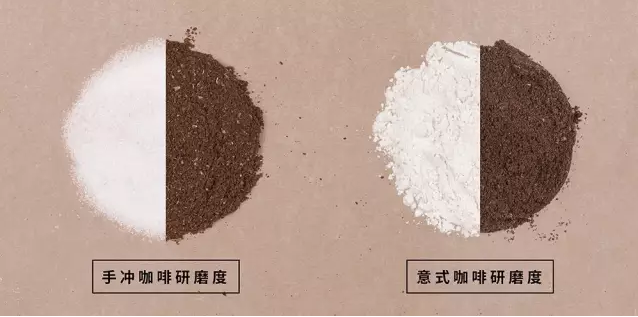
Of course, in addition to the thickness of the powder, the choice of coffee beans is also very important (read silently three times, the raw material is the most important! )
In addition to the traditional Italian blending (two or more beans are usually roasted deeply), with the rise of boutique coffee culture in recent years, more and more baristas have begun to use coffee from a single origin and slightly shallow roasting to present espresso, that is, S.O.E. (single origin espresso).
The advantage of blending is that the quality and taste are stable for many years and will not change greatly when one of the beans is out of stock. S.O.E. On the other hand, you can drink with relatively clear characteristics of origin. Specifically, you can read this article to make up the lesson: it's not your problem that you can't drink coffee.
By collecting all three, you can summon the soul of a cup of espresso!
Fill the coffee powder into the powder bowl and tamp it. When the hot water passes through pressed powder, the resistance increases suddenly, but under the pressure of 9 atmospheres, the hot water passes through the coffee powder quickly and dissolves the aroma, taste and other substances in the coffee powder into the water.
So, what exactly is Crema?
Espresso, usually accompanied by a by-product, Crema, floats on the coffee surface like a layer of cream.
The question is, what exactly is Crema? How did you get here? Freshly roasted coffee beans are rich in carbon dioxide, which is melted into coffee under pressure in the process of concentration. But when the hot water passes through the coffee pressed powder, the coffee liquid from the powder bowl returns from nine atmospheres to the normal one.
At this point, because of the pressure difference, carbon dioxide expands and becomes the so-called "grease / crema". In fact, crema is a bubble, not grease at all. Haha.

Is there a Crema, a sign of good coffee?
A cup of espresso without crema means the beans are not fresh (low in carbon dioxide) or the barista is too lame. It's bound to be bad. Pull!
However, crema itself has nothing to do with the taste of coffee. You can dig up the crema on the coffee and eat it sometime. ..

| 2 | the quality of concentration is closely related to them. |
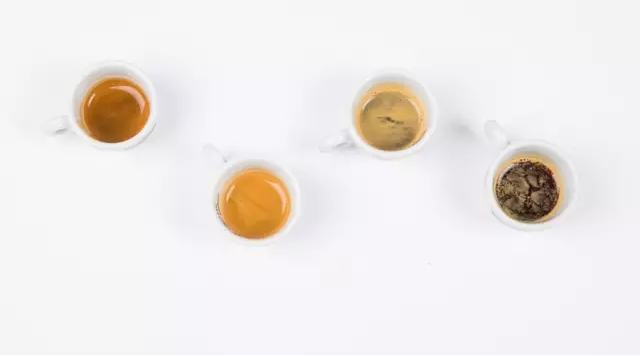
"sour, bitter, hard to swallow", most people drink the first espresso is simply unacceptable, have to add a lot of milk or sugar, in order to swallow three and two stomach.
Some people drink concentrate, not because of how delicious it is, but to save trouble. One shot, two shot, spirit all day, more effective than Red Bull. There is also a very ferocious way to make it drinkable, which is to add a piece of whipped cream (Whipped Cream), a cup of Espresso con panna and a spoonful of brown sugar at the bottom of the cup to make it easier to accept.
But I still have to say, if you think the concentrate tastes bad, believe me, that's not its problem.
This seemingly simple and direct dark brown coffee nakedly shows the original flavor of the coffee. in fact, it contains too many variables (bad beans, not fresh beans, poor grinding, incorrect powder pressure, improper machine operation, extraction time is too short or too long. Only by strictly controlling every detail of the production, is it possible to get a perfect espresso.
To put it simply, a cup of perfectly concentrated taste is as follows:

Summary: delicious espresso, focusing on the flavor of the place of origin, beautiful acidity, as well as the sweetness when the acidity fades, and the round and smooth taste. Let's review it a little bit:
The most important thing is the sense of balance! The sour, sweet and bitter of coffee blend in the mouth. Coffee is a kind of fruit, which must be sour, comfortable and complex, followed by obvious and rapid sweetness; no more bitterness, like background music, is used to support the two protagonists of coffee: acidity and sweetness. The taste must be smooth and round, and there should be no astringency or rough astringency in the mouth. There are also identifiable flavors, such as oranges, apples, grapes, butter, nuts and so on.
To do this, of course, the indispensable is properly roasted boutique coffee beans, coffee maker, bean grinder, and barista!
Important Notice :
前街咖啡 FrontStreet Coffee has moved to new addredd:
FrontStreet Coffee Address: 315,Donghua East Road,GuangZhou
Tel:020 38364473
- Prev
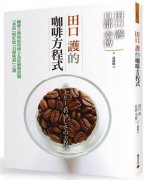
Coffee Book recommendation: Taguchi's Coffee equation
Book title: coffee equation of Taguchi Guard author: Taguchi Keiko translator: published by Huang Wei concubine: building block culture purchase way: omnipotent Taobao ~ Mr. Taguchi, those who like coffee should be no strangers, but those who have some in-depth understanding of coffee, the old man's work is basically a must for the collection, before the Coffee Collection, and then the Fine Coffee Collection, now
- Next
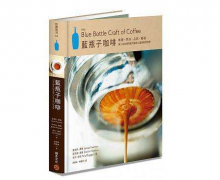
Coffee book recommendation: lovely technical control work "the Blue Bottle Craft of Cof"
What was the name of the first coffee shop in Vienna? Blue bottle Cafe. This blue bottle is not that blue bottle. When I was getting started with coffee, I looked up the Blue bottle Cafe. As a result, I found a chain store in the United States. It seemed that I went to the website for a brief walk. Later, when I talked about the topic of the earliest coffee shop in the world, I also mentioned that there is a blue bottle in the United States now. It is a place.
Related
- Beginners will see the "Coffee pull flower" guide!
- What is the difference between ice blog purified milk and ordinary milk coffee?
- Why is the Philippines the largest producer of crops in Liberia?
- For coffee extraction, should the fine powder be retained?
- How does extracted espresso fill pressed powder? How much strength does it take to press the powder?
- How to make jasmine cold extract coffee? Is the jasmine + latte good?
- Will this little toy really make the coffee taste better? How does Lily Drip affect coffee extraction?
- Will the action of slapping the filter cup also affect coffee extraction?
- What's the difference between powder-to-water ratio and powder-to-liquid ratio?
- What is the Ethiopian local species? What does it have to do with Heirloom native species?

